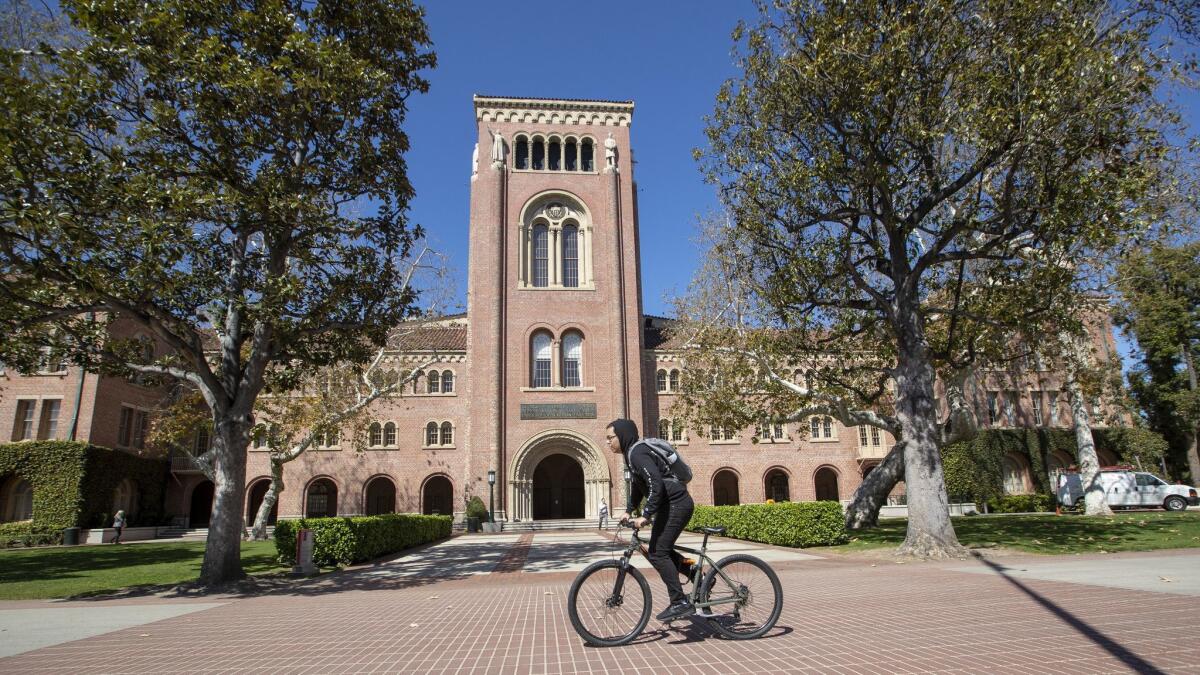There’s a loneliness crisis on college campuses

- Share via
When I arrived at USC 11 years ago as dean of religious life, my pastoral conversations with students mostly focused on their quests for meaning and purpose. They were striving to translate values into action, cultivate joy and gratitude, live extraordinary lives.
But over the last several years, these conversations have taken a devastating turn. Whereas students used to ask “How should I live?” they are now more likely to ask “Why should I live?” Where they used to talk about hope and meaning; now they grapple with hopelessness and meaninglessness. Every year, it seems, I encounter more stress, anxiety, and depression, and more students in crisis on campus.
My colleagues at other universities say they are seeing the same distressing trend, and research backs up our observations.
I never got the question in my first five years at USC that I now get almost daily from students: “How do I make friends?”
According to the Center for Collegiate Mental Health, the increase in utilization rates for counseling centers across the country over the last five years has greatly outpaced the increase in student enrollment, and as a result, schools have trouble hiring enough mental health counselors to keep up with growing demand. The most recent Healthy Minds Survey, an annual report on mental health on college and university campuses, found that one-third of undergraduate students in the United States wrestle with some kind of mental health issue, while more than 10% struggle with thoughts of suicide. The Cooperative Institutional Research Program’s large annual survey of college freshmen has noted a marked and steady downward trend in the self-reported emotional health of students along with a large uptick in self-reported feelings of being overwhelmed.
What I have noticed in my work with students is that many of them face the same hidden root challenge: loneliness. According to a recent survey by the global health service company Cigna, the loneliest generation in the United States today is not the oldest Americans but the youngest, specifically young adults between 18 and 22 years old.
I never got the question in my first five years at USC that I now get almost daily from students: “How do I make friends?” Students may have thousands of friends online, but few in real life; they may be experts at talking with their thumbs, but not so much with their tongues. As a result, many feel as though they don’t have a tribe or a sense of belonging. They feel disconnected from what it means to be human.
While it is now fashionable to refer to this cohort of college and university students as a coddled generation of “snowflakes,” the reality is they face unprecedented challenges and circumstances. They are entering a world in which many of the career paths of their parents’ generation no longer exist or have changed drastically. They face escalating tuition costs with little sense of whether their future opportunities justify the outlay. They have participated in active shooter trainings and campus lockdown drills for most of their lives. And according to the Pew Research Center’s Forum on Religion and Public Life, more than one-third of young adults are now disaffiliated with religion, marking a dramatic generational shift away from religion and from the comfort and community that it can provide.
The convergence of these factors and realities has directly contributed to a crippling sense of anxiety and alienation in students across the country.
But today’s students are also creative and courageous, engaged and empathetic, diverse and inclusive. They are hardworking and goal-oriented. It needs to be the job of colleges and universities to help students develop resources that enable them to thrive and flourish mentally, emotionally and spiritually, so that they may fulfill their academic aspirations and achieve their professional goals.
Enter the Fray: First takes on the news of the minute »
At USC, we’re trying a variety of things, including a dedicated mindfulness training app and free mindfulness programs that reach more than 7,000 people a year. A new, for-credit freshman course called Thrive focuses on emotional intelligence, healthy relationships, self-care, resiliency and human flourishing. In the fall, we will debut our new artificial intelligence well-being assistant, named Ari, which will guide students to appropriate support resources and communities on campus.
We also offer and host yoga classes, drum circles, friendship courses, community teas, coloring sessions, laughing groups, sleep classes, connection workshops, meditation retreats, campfire conversations and primal scream opportunities. We’ve recently appointed our first director of belonging, while our full-time wellness dog, Professor Beauregard Tirebiter (affectionately known as “Beau”) strolls the campus daily.
Colleges and universities have always had a responsibility to develop the whole student so that our young people are able to make not just a living, but a life. Today, that means examining a new range of challenges that students face and developing a new approach to well-being on campus. By doing so, colleges and universities can help empower students to transform the world by transforming themselves.
Varun Soni is dean of religious life at USC, where he also serves as vice provost of campus wellness and crisis intervention.
More to Read
A cure for the common opinion
Get thought-provoking perspectives with our weekly newsletter.
You may occasionally receive promotional content from the Los Angeles Times.






